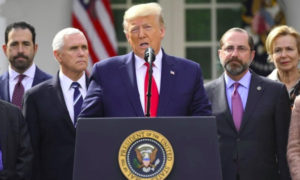One Giant Leap for America
Barack Obama represents not just a bridge between America's various cultural, racial and spiritual communities. According to Madison Shockley, the eminently qualified Sen. Obama holds out the promise of a much-needed healing for America by "just standing there allowing us to say 'Yes' to him."America is downright giddy with the possibility of electing its first black president. You can feel it in the air whenever the subject of Barack Obama comes up. His recent primary performances have obliterated any doubt about his electability. We’ve never been here before, and this time we think it just might happen. The first “black” candidate to raise the serious prospect of actual election was Colin Powell in 1995.
But Powell never became a candidate. You may remember Shirley Chisholm, who ran for president (or, at least, the Democratic Party nomination) in 1972. Chisholm was the first woman (take that, Hillary) and the first black person to do so. Then Jesse Jackson ran in 1984 and 1988.
And now, Barack Obama is getting the same kind of electric response as Powell, albeit primarily from white Democrats rather than Powell’s Republican support base. So what are the differences between the candidacies of Shirley Chisholm and Jesse Jackson on the one hand and Colin Powell and Barack Obama on the other? Chisholm and Jackson were not just black candidates; they were “angry” black candidates — angry about injustice, angry about wealth disparity, angry about discrimination.
Powell and Obama have a political history that tracks on a different trajectory. After Powell retired, fresh from a swift and nearly bloodless (in terms of American lives) victory in the Gulf War, the whole nation seemed in awe of this man who commanded not just the armed forces in the Gulf but the respect of an entire nation — and who just happened to be black. It didn’t hurt that he didn’t look all that black either.
Similarly, Barack Obama’s blackness seems secondary, not primary. Obama is what I like to call “immediately biracial.” His mother was white, and his father was a black African from Kenya. While still a candidate for the U.S. Senate, his speech before the Democratic National Convention in 2004 was not only memorable for its flawless delivery but also for its prescient content. He spoke of a “purple” America at a time when we were deeply divided by red and blue. I believe it was his life history of blending colors that led him so easily to this multihued metaphor.
Since his election to the Senate, Obama has only grown in the esteem of his party and his nation. The audio version of his best-selling autobiography, “The Audacity of Hope: Thoughts on Reclaiming the American Dream,” features nearly 16 hours of his sonorous voice dancing in our ears, spinning a fascinating tale of one who “discovers” his race through a series of events both chosen and unchosen. His book invites America, primarily white America, to join him on a journey of discovery and healing.
Ahh, healing — that’s the real magic of Barack Obama. Just standing before us, Obama symbolizes much of the healing that America so desperately needs. His family tree of black and white branches heals the fundamental fissure in the foundation of American culture: that of race. His second-generation immigrant status speaks volumes about what immigration can contribute to our society. His Arabic names raises the question of whether we can overcome our hatred and prejudice against Muslims and all things Islamic long enough to pull the lever for a man whose middle name is Hussein and whose last name, as his detractors have duly noted, rhymes with Osama. He represents that unique blend of evangelical faith and enlightened sensibilities, thus building a bridge across a growing gulf in our religious culture. He heals all of these rifts just standing there allowing us to say “Yes” to him. And when we do, it feels so good. And America has not been able to feel good about itself for quite a long time.
Then, Obama opens his mouth and reveals the genius-level IQ of a Harvard Law graduate while bouncing along in the rhythmic cadence of his black church experience. He opens his life and shows us a genuine commitment to his vision of an America where hard work is rewarded with achievement and complexion is conquered by competence (because he has personally demonstrated both outcomes). Now our collective voice rises even higher and the “Yes” of our initial infatuation becomes the “Yesssssssss!!!!!!” of pure love.
This good feeling will be more critical in the upcoming elections than his brief political tenure. After all, history will probably attribute the failed presidency of George W. Bush more to his lack of intellectual curiosity and his stubborn dogmatism than to a simple lack of experience in the nation’s highest office.
Barack Obama will be the next president of the United States because those voting for him don’t just like him. They love him. And no other candidate in either party has generated a fraction of the affection that Obama inspires. The woman who asked the question that made Hillary Clinton cry (and thus opened the floodgates of female voters that swept her to victory in New Hampshire) wound up voting for Obama because he made her cry while listening to him speak.
Barack Obama will be the next president of the United States, not the first black president of the United States. That detail will ultimately be ranked alongside others like the wingspan of his ears and the name of his father’s village in Kenya.
Your support matters…Independent journalism is under threat and overshadowed by heavily funded mainstream media.
You can help level the playing field. Become a member.
Your tax-deductible contribution keeps us digging beneath the headlines to give you thought-provoking, investigative reporting and analysis that unearths what's really happening- without compromise.
Give today to support our courageous, independent journalists.






You need to be a supporter to comment.
There are currently no responses to this article.
Be the first to respond.